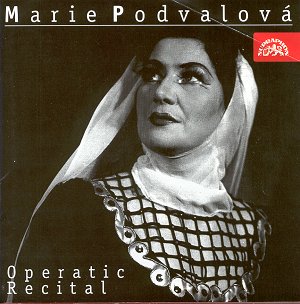Marie Podvalová (1909-1992) cut an imposing
figure on-stage and had a magnificent dramatic soprano voice. These
recordings of standard Czech operatic fare are a wonderful testimony
to her, as they were made when she was in her vocal prime at the start
of the 1950s. She made the Smetana roles her own (Milada in Dalibor
and the title role of Libuše), but Fibich’s Šárka
(again the title role) became her trademark, and she was lucky to have
worked under those great Czech opera and recording conductors Talich,
Chalabala and Krombholc. Her voice is richly dark in terms of colour,
yet it also possesses a considerably varied warmth of sound, intense,
tender, powerful and dramatic. These arias may not be the familiar ones
from Bartered Bride but serve as an excellent introduction to
Smetana’s tragic, nationalistic operas. Her portrayal of Milada in Dalibor
(1868) is evidence of how great she must have been in that similar trouser
role, Leonore in Beethoven’s Fidelio.
There is just the one extract from Dvořák’s Rusalka
(1901) and it is not the familiar ‘Song to the Moon’, indeed here Podvalová
takes the role of the wicked Princess for this feisty conclusion to
the second act. Much (25 minutes) of the second act of Šárka,
a beautiful opera written in 1897 by Fibich gets an airing here, her
great aria, a wonderful love duet (with tenor Lubomír Havlák)
forming a substantial scena; this was a role she had first sung in 1938
to great acclaim under Chalabala as here. The closing scene from Libuše
(1881) in which the heroine prophesies a bright future for the Czech
nation provides Podvalová with the best opportunity to shine.
Some of the supporting roles featuring in duets or
other ensembles are unmemorable, in Dalibor there are moments
of ‘ghostly’ anticipations of entries after a pause which have either
appeared or slipped through the net in the digital transfer, and some
of the orchestral playing may not always be up to standard. Live performances
from the theatre contain the usual hazards and blemishes. However as
an enduring memory of this fine voice and an exemplary artist it is
a worthy disc.
Christopher Fifield
